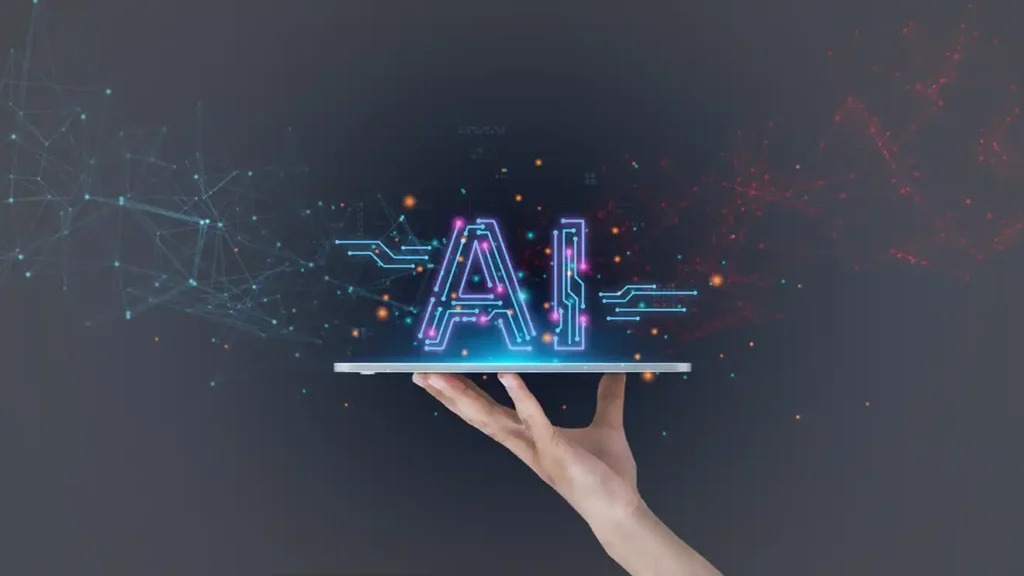Last updated September 22, 2025.
These are exciting times in the world of AI. The market is flooded with new tools, both general and specialized. Everyone is promising the moon—but it’s hard to know if all the hype is real.
There are more serious questions, too. What can you gain from AI?
How will it affect your teams?
How do you assess your AI readiness?
And of course—what’s the right AI strategy that enables your success and delivers an ROI for your organization?
Here’s everything you need to know to leverage AI as a service.
What is AI as a service?
AI as a service (also called AIaaS) is a productized AI offering that is available as a service over the internet, much like SaaS (software as a service). Most AI tools on the market today fall into the AIaaS category. Rather than hosting an AI tool on your own servers or building your own AI solution, you pay a monthly service fee to use an AI tool.
Is AIaaS the same thing as AI managed services?
Are “AI managed services” the same thing as “AI as a service?”
No. While they may overlap, these two offerings are different.
AI managed services are professional services that cover the implementation and ongoing management of an AI solution. These services are offered by an MSP (managed service provider) like Corsica Technologies, who has deep expertise in AI.
These managed services can help you get the most out of an AIaaS solution.
What are the benefits of AI as a service?
Regardless of your particular use case, AIaaS has many benefits. Here are the most common ones that apply across the board.
- Operational insight. AI can help you uncover opportunities for improvement in complex internal processes.
- Efficiency. Applied wisely, AI can greatly improve the efficiency of operational processes.
- Cost savings. AI can optimize or replace costly manual processes.
- Cleaner data. When integrated into other essential systems, AI can help your organization produce and consume more accurate data.
- Business intelligence. AI systems can analyze complex performance data and provide exceptional insights for strategic decisions.
- Financial intelligence. AI can work with financial data to produce historical analysis as well as predictive insight.

What are the benefits of AI managed services?
AI managed services include all the benefits of AIaaS. They also come with unique benefits that you don’t get if you manage AI in-house. Here are the benefits that our clients experience.
- Comprehensive AI readiness assessment. Where do you stand today? What steps do you need to take to prepare your environment, your data, and your team for AI?
- Better AI strategy. AIaaS is powerful, but you need to apply it properly at your organization—and you have to be ready to adapt as technology and customer expectations continue to evolve. Managed services provide the ongoing strategic perspective you need to get the most out of AI, both now and in the future.
- Robust AI governance. You don’t want to launch an AI tool without establishing policies for acceptable use. An AI managed service provider brings proven frameworks and governance policies that you can use out of the box or adapt to your organization.
- Applied workshops for AI use cases. You’d be amazed at the AI use cases that your team can come up with. AI managed services provide facilitated workshops to uncover your biggest AI opportunities—both before launch, and as needed, since AI technology continues to evolve.
- Data security risks minimized. If you implement AI without optimizing your internal data and reviewing user permissions, your AI solution could expose sensitive internal data to users who shouldn’t see it. Managed services ensure your data is organized and your permissions are appropriate—both at launch and on a continual basis.
- AI integration services. The true power of AIaaS lies in integrations to other essential systems. When AI can securely reference and interpret internal business data, you reach a new level of insight and productivity. Managed services provide secure AI integration with critical systems like Microsoft 365, ERP, CRM, and more—both at launch and in ongoing support.
- AI enablement and training. It’s one thing to launch AI as a service. But is your team ready for such a powerful tool? Are they equipped to get the most out of it? Training and user enablement are essential components, and AI managed services can cover these requirements with proven processes and frameworks.
What are the real capabilities of AI today vs. hype?
AI capabilities today are incredible—but it’s important to gain a nuanced understanding of what these technologies can and can’t do.
| Function | Hype | Real Capability |
| Meetings | Tell you what’s strategically most important from meetings | AI tools can listen to calls, produce transcripts, and summarize key points and to-do lists. |
| Calendars | Know your calendar priorities better than you do | AI can schedule meetings, act as an intermediary, and prioritize events. |
| Execute tasks | Eliminate the need for human review | AI agents can analyze data, perform actions in software, and report outcomes—but still need human oversight. |
Uncovering real AIaaS capabilities for your organization
When it comes to AI capabilities, the above list is only the beginning.
The power of AI as a service lies not only in its general capabilities, but in its applied capabilities. And applying AI effectively requires knowledge of two things:
- Your organization’s unique processes and challenges
- The capabilities of best-fit AI tools
Here at Corsica Technologies, we consult with customers regularly to help them uncover use cases that are tailored to their unique challenges. Contact us today to learn more about your AI opportunities.
Will AI replace human workers or make them more effective and efficient?
AI will do both.
Its exact impact will depend on the role in question.
Consider entry-level jobs in fields like research or coding. Success here depends less on new creative insight and more on completeness of facts or logic incorporated into an output. AI excels at executing tasks that require comprehensive knowledge within a specific, logical domain that’s well-documented on the internet (or in internal data). Consequently, these jobs are in a prime position to be significantly altered or eliminated by AI.
At the other end of the spectrum, consider jobs that require a high level of intuition, experience, empathy, and strategic acumen. Your best sales rep is never going to be replaced by AI. This person creates value by caring deeply about customers and striving to meet their needs. Likewise, strategic leadership roles in marketing, finance, and operations won’t be eliminated by AI. Rather, AI will equip these workers to offload mundane tasks and focus on higher-value strategic activities.

What internal skills or resources are needed to manage and maintain AI as a service?
AIaaS providers take care of everything related to their core product. But that doesn’t mean their customers don’t have to spend time and effort maintaining AI solutions.
The exact skills and resources required will depend on the AI tool and the use case. However, here are the capabilities that are required to keep our clients’ AI solutions up and running.
- An evolving, strategic vision for AI. It’s not enough to launch AI today and never again examine how it aligns with your strategic vision. AIaaS technology is constantly changing, and shifts in customer expectations and competitive trends will change your strategy as time goes on. Someone needs to take ownership of the evolving, long-term vision for AI at your organization.
- Data governance expertise. An integrated AI tool is only as good as the data to which it has access. It’s essential to clean up your data as part of your AI implementation, but this requirement doesn’t stop after launch. Your data will need periodic attention to keep it organized and secure in the context of AI access.
- Data integration capabilities. Businesses get the most out of AI when the tool isn’t working in a vacuum. You need deep integration to other essential systems like Microsoft 365, ERP, CRM, and so on. Building and maintaining these integrations takes time, effort, and specialized expertise.
- Awareness of emerging AI capabilities. The field of AI is evolving so fast, it’s tough to keep up if AI isn’t your core responsibility. But you need to stay aware of new features, integrations, and capabilities in your AI tools—so you can apply them to your specific use cases.
- Cultural leadership. AI is most effective when your team understands how to use it and doesn’t view it as a threat. Aligning everyone around AI initiatives requires soft skills and cultural leadership capabilities.
Most organizations struggle to cover all these capabilities with staff resources. That’s why they turn to AI managed service providers like Corsica Technologies.
What kind of integration and deployment process should we expect with AI as a service?
The integration and deployment of AIaaS will vary from organization to organization. However, here are the general steps in the process that we use with our clients.
- Envision and align. We work with you to prepare your team and your environment for a successful AIaaS launch.
- Establish your data foundation. We help solidify your internal AI environment, your on-staff expertise, and an AI-first culture.
- Build, integrate, and experiment. We work with your team to streamline workflows and develop revolutionary AI use cases that are tailored to your operations.
- Optimize and grow. We help you expand your capabilities and measurable outcomes through regular dialogue and KPI review.
How can we measure the effectiveness and ROI of AIaaS?
The right measure of ROI from AIaaS will depend on what processes are using the tool. Broadly speaking, AI ROI is typically measured in one of two ways:
- Revenue gains
- Cost savings
While AI tools may influence both, the measure of AI ROI should align with the measure of success for the process in question.
If AI is used in operations, service delivery, or production, cost savings may be the right measure of ROI for AIaaS.
If AI is used in sales and marketing, revenue gains may be the right measure of ROI.
Of course, attributing financial impact to AI tools can be quite challenging. A managed service provider can help here, providing tools, processes, and best practices to determine ROI from AIaaS.
The takeaway: Find out what AI can do for you
The world of AI is exploding with possibilities—but you have to implement these tools properly in the context of your organization. You also need to manage these tools over the long term to get the largest operational impact while maintaining data security. Here at Corsica Technologies, we’ve helped 1,000+ clients solve their technology challenges. Contact us today to take your next step with AI.

Want to learn more about AI as a service?
Reach out to schedule a consultation with our transformation specialists.













